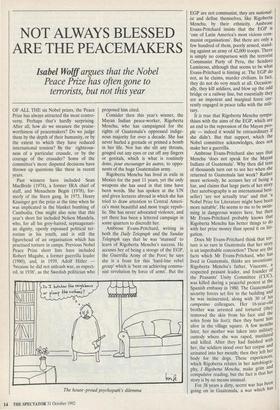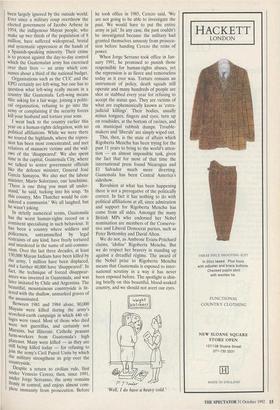NOT ALWAYS BLESSED ARE THE PEACEMAKERS
Isabel Wolff argues that the Nobel
Peace Prize has often gone to terrorists, but not this year
OF ALL THE six Nobel prizes, the Peace Prize has always attracted the most contro- versy. Perhaps that's hardly surprising. After all, how do we measure the praise- worthiness of peacemakers? Do we judge them by the depth of their humanity, or by the extent to which they have reduced international tension? By the righteous- ness of a particular crusade, or by the courage of the crusader? Some of the committee's more disputed decisions have thrown up questions like these in recent years.
Past winners have included Sean MacBride (1974), a former IRA chief of staff, and Menachem Begin (1978), for- merly of the Stern gang. In 1973, Henry Kissinger got the prize at the time when he was implicated in the blanket bombing of Cambodia. One might also note that this year's short list included Nelson Mandela, who, for all his grey-haired, septuagenari- an dignity, openly espoused political ter- rorism in his youth, and is still the figurehead of an organisation which has practised torture in camps. Previous Nobel Peace Prize short lists have included Robert Mugabe, a former guerrilla leader (1980), and, in 1939, Adolf Hitler 'because he did not unleash war, as expect- ed, in 1938', as the Swedish politician who proposed him cited.
Consider then this year's winner, the Mayan Indian peace-worker, Rigoberta Menchu, who has campaigned for the rights of Guatemala's oppressed indige- nous majority for over a decade. She has never hurled a grenade or primed a bomb in her life. Nor has she slit any throats, gouged out any eyes or cut off any fingers or genitals, which is what is routinely done, pour encourager les autres, to oppo- nents of the huge Guatemalan army.
Rigoberta Menchu has lived in exile in Mexico for the past 11 years, yet the only weapons she has used in that time have been words. She has spoken at the UN and given lectures abroad in which she has tried to draw attention to Central Ameri- ca's most beautiful and most tragic repub- lic. She has never advocated violence, and yet there has been a lettered campaign in some quarters to discredit her.
Ambrose Evans-Pritchard, writing in both the Daily Telegraph and the Sunday Telegraph says that he was 'stunned' to learn of Rigoberta Menchu's success. He accuses her of being a stooge of the EGP, the Guerrilla Army of the Poor; he says she is a front for this 'hard-line rebel group' which is 'bent on achieving commu- nist revolution by force of arms'. But the The house-proud psychopath's dilemma EGP are not communist, they are national- ist and define themselves, like Rigoberta Menchu, by their ethnicity. Ambrose Evans-Pritchard insists that the EGP is `one of Latin America's most vicious com- munist organisations'. But there are only a few hundred of them, poorly armed, stand- ing against an army of 42,000 troops. There is simply no comparison with the terrorist Communist Party of Peru, the Sendero Luminoso, although that seems to be what Evans-Pritchard is hinting at. The EGP do not, as he claims, murder civilians. In fact, they do not do very much at all. Occasion- ally, they kill soldiers, and blow up the odd bridge or a railway line, but essentially they are an impotent and marginal force cur- rently engaged in peace talks with the mili- tary.
It is true that Rigoberta Menchu sympa- thises with the aims of the EGP, which are an end to the repression of the Mayan peo- ple — indeed it would be extraordinary if she didn't. But that support, which the Nobel committee acknowledges, does not make her a guerrilla. Ambrose Evans-Pritchard also says that Menchu 'does not speak for the Mayan Indians of Guatemala'. Why then did tens of thousands turn out to see her when she returned to Guatemala last week? Rather more seriously, he accuses her of being a liar, and claims that large parts of her story (her autobiography is an international best- seller) 'are not actually true' and that 'a Nobel Prize for Literature might have been more suitable'. He seems to me to be swim- ming in dangerous waters here, but then Mr Evans-Pritchard probably knows that Rigoberta Menchu has better things to do with her prize money than spend it on liti- gation.
Does Mr Evans-Pritchard think that tor- ture is so rare in Guatemala that her story is an improbable concoction? These are the facts which Mr Evans-Pritchard, who has lived in Guatemala, thinks are inventions: Rigoberta Menchu's father, Vincente, a respected peasant leader, and founder of the Peasants' Unity Committee (CUC), was killed during a peaceful protest at the Spanish embassy in 1980. The Guatemalan security forces set fire to the building and he was incinerated, along with 30 of his campesino colleagues. Her 16-year-old brother was arrested and tortured (they removed the skin from his face and the soles from his feet); then they burnt him alive in the village square. A few months later, her mother was taken into military custody where she was raped, mutilated and killed. After they had finished with her, the soldiers stood over her corpse and urinated into her mouth; then they left her body for the dogs. These experiences, which Rigoberta relates in her autobiogra- phy, 1 Rigoberta Menchu, make grim and compulsive reading, but the fact is that her story is by no means unusual. For 38 years a dirty, secret war has been going on in Guatemala, a war which has been largely ignored by the outside world. Ever since a military coup overthrew the elected government of Jacobo Arbenz in 1954, the indigenous Mayan people, who make up two thirds of the population of 8 million, have suffered widespread, brutal and systematic oppression at the hands of a Spanish-speaking minority. Their crime is to protest against the day-to-day control which the Guatemalan army has exercised over their lives — an army which con- sumes about a third of the national budget.
Organisations such as the CUC and the EPG certainly are left-wing, but one has to question what left-wing really means in a country like Guatemala. Left-wing means this: asking for a fair wage, joining a politi- cal organisation, refusing to go into the army or complaining if the security forces kill your husband and torture your sons.
I went back to the country earlier this Year on a human-rights delegation, with no political affiliations. While we were there we toured the highlands, where the repres- sion has been most concentrated, and met relatives of massacre victims and the wid- ows of the 'disappeared'. We also spent time in the capital, Guatemala City, where we talked to senior government officials like the defence minister, General Jose Garcia Samayoa. We also met the labour minister, Mario Solorzano, one lunchtime. `There is one thing you must all under- stand,' he said, tucking into his soup. 'In this country, Mrs Thatcher would be con- sidered a communist.' We all laughed, but he wasn't joking. In strictly numerical terms, Guatemala has the worst human-rights record on a Continent specialising in such behaviour. It has been a country where soldiers and policemen, untrammelled by legal restraints of any kind, have freely tortured and murdered in the name of anti-commu- nism. Over the last three decades, at least 150,000 Mayan Indians have been killed by the army, 1 million have been displaced, and a further 40,000 have 'disappeared'. In fact, the technique of forced disappear- ances was invented in Guatemala, and was later imitated by Chile and Argentina. The beautiful, mountainous countryside is lit- tered with the shallow, unmarked graves of the assassinated.
Between 1981 and 1984 alone, 80,000 Mayans were killed during the army's scorched-earth campaign in which 440 vil- lages were rased. Most of those who died were not guerrillas, and certainly not Marxists, but illiterate, Catholic peasant farm-workers from Guatemala's high plateaux. Many were killed — as they are still being killed today — for refusing to Join the army's Civil Patrol Units by which the military strengthens its grip over the Countryside. Despite a return to civilian rule, first under Venecio Cerezo, then, since 1991, under Jorge Serranno, the army remains firmly in control, and enjoys almost com- plete immunity from prosecution. Before he took office in 1985, Cerezo said, 'We are not going to be able to investigate the past. We would have to put the entire army in jail.' In any case, the past couldn't be investigated because the military had granted themselves amnesty from prosecu- tion before handing Cerezo the reins of power.
When Jorge Serrano took office in Jan- uary 1991, he promised to punish those responsible for human-rights abuses, yet the repression is as fierce and remorseless today as it ever was. Torture remains an instrument of policy, death squads still operate and many hundreds of people are shot or stabbed every year for refusing to accept the status quo. They are victims of what are euphemistically known as 'extra- judicial killings'. Their bodies, usually minus tongues, fingers and eyes, turn up on roadsides, at the bottom of ravines, and on municipal rubbish dumps. Trouble- makers and 'liberals' are simply wiped out.
This, then, is the state of affairs which Rigoberta Menchu has been trying for the past 11 years to bring to the world's atten- tion — an almost impossible task, given the fact that for most of that time the international press found Nicaragua and El Salvador much more diverting. Guatemala has been Central America's sideshow.
Revulsion at what has been happening there is not a prerogative of the politically correct. In fact it has nothing to do with political affiliations at all, since admiration and support for Rigoberta Menchu has come from all sides. Amongst the many British MPs who endorsed her Nobel nomination are members of the Conserva- tive and Liberal Democrat parties, such as Peter Bottomley and David Alton.
We do not, as Ambrose Evans-Pritchard claims, 'idolise' Rigoberta Menchu. But we do respect her bravery in standing up against a dreadful regime. The award of the Nobel prize to Rigoberta Menchu means that Guatemala is exposed to inter- national scrutiny in a way it has never been exposed before. The spotlight is shin- ing briefly on this beautiful, blood-soaked country, and we should not avert our eyes.
`Well, I do have a heavy cold.'



























































 Previous page
Previous page